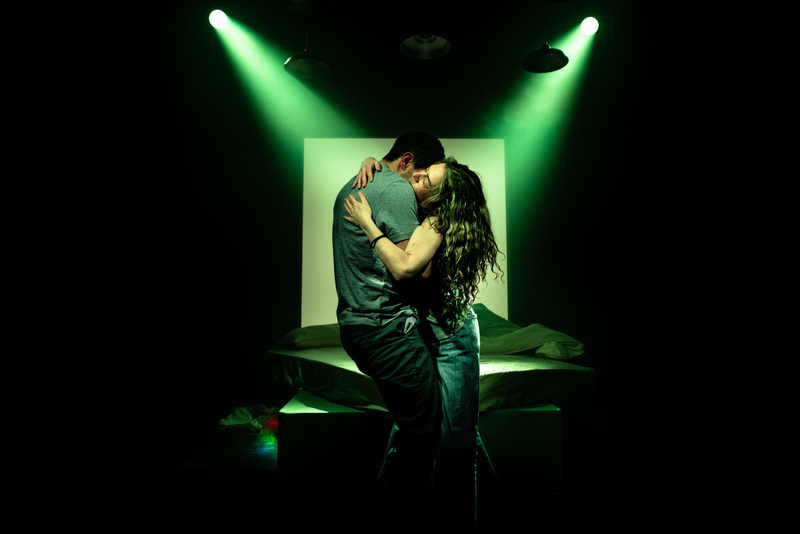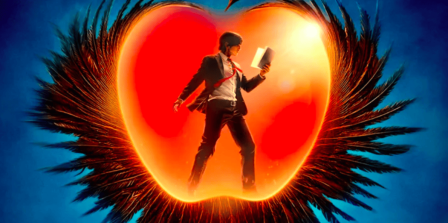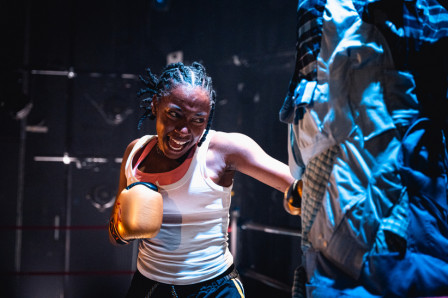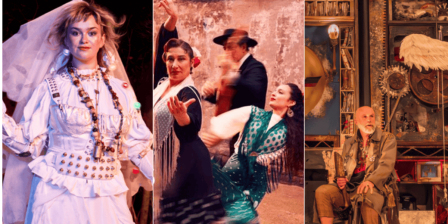Review: CONVERSATIONS AFTER SEX at Park Theatre
With clothing and underwear strewn all across the stage, a dishevelled, Tracey Emin-esque bed, illumination of a large-scale light-box behind and a cohort of late-night ‘just before the club closes’ music, we knew exactly what was going on here, almost as though we were -ahem interrupting something…
 Conversations After Sex. Photo by Jake Bush.
Conversations After Sex. Photo by Jake Bush.
In fact, so heavily implied were the sexual undertones that you could say the full-frontal nudity we witnessed in the very first minute of the performance was unnecessary. However, as we were to discover, in this 90-minute one-act play, every little detail matters.
In the play, written by Mark O’Halloran, and winner of Best New Play at the Irish Theatre Awards 2022, the central character is known as ‘she’. We never learn her name, but go on to discover much more personal and private details about her life and personal experiences, all revealed through the conversations she has in bed with strangers. We soon learn that ‘she’ has been sleeping around with a variety of men - all played by the wonderfully dextrous Julian Moore-Cook. Throughout the play, more and more is revealed about her motives for doing so. You might wonder how O’Halloran, a male writer, will make sense of the female motivations for the passing sexual encounter. Whilst this is, of course, something experienced by all genders, the emotional repercussions and aftermath are far from universal. However, he has triumphed here in this seamless, sophisticated and at times harrowing navigation through the world of hook-up culture.
Olivia Lindsay shines as ‘she’ - a woman caught up in this tumultuous and turbulent world. Unnamed, probably because she more often than not is viewed by the other characters simply as a sort of vessel for their emissions - an ear for their worries, troubles and even the recipient of their angry onslaughts. Lindsey perfectly encapsulates the delicate nuance of communication after intimacy. One partner refuses to even tell her his name, and outright tells her about the other women in his life, including his fiancée. Here, she’ balances humour with the shock and disgust she shares with the audience. In fact, the darkly comedic elements in this piece always land when meticulously mellowing out the more intense and disturbing scenes.
Nonetheless, the undercurrent of inner turmoil faced by ‘she’ is ever-present and often rears its head in the form of an emotional outburst, tears or an argument with whichever companion is present. It is soon apparent that ‘she’ has lost touch with her friends and loved ones, isolating herself and finding companionship through these hook-ups. She has become expert at removing sex from love, and even from any emotion at all.
Scene changes are slick - signified with a change in colour of the lightbox to a deeper, more suggestive red. Each scene brings a new man, but the same ‘she’. All of the action takes place in a bed - either hers, theirs or in a hotel. Whilst some men do crop up more than once, it is evident that, just as she is serving a purpose for them, the same goes vice versa. With some, she seems to enjoy delving into their lives as a means of escaping from her own, learning that she is not the only one with issues. She carefully shields herself from prying too deeply and upsetting them by reverting to the safety of ‘dirty talk’. Where things go awry, however, is when their personalities clash. Julian excels at presenting both as calm and gentle men, and then switching to the more quick-to-anger companions, when in the company of whom we fear for ‘she’s’ safety.
Her attempts to create ‘dialogue’ can even result in their own overstepping the mark, and causing an overwhelming emotional response from ‘she’. It is at these moments we learn more about the darkness and emotional trauma of her past.
There is indeed a mixed bag of experiences had by ‘she’ throughout her sexual pursuits, yet not all are necessarily bad. By the end, the audience certainly finds themselves wondering if these encounters are actually mutually benefiting both parties - a chance for them to open up within the safety of anonymity. One wonders if sharing something so intimate naturally makes you vulnerable, and therefore, any dialogue after becomes more therapeutic and honest.
The play does superbly well in dealing with what is, fundamentally, an odd situation in which two strangers have shared one of the most intimate acts and then digest the aftermath together. Credit to director Jess Edwards, who leans into the absurdity with the appropriate awkwardness and humour, and Bethany Gupwell and Xana for brilliantly executed lighting and music which complements the urgency of the piece.
This is a thoroughly relevant and necessary insight into an unspoken element of modern life, and I highly recommend you go see this triumph of a play.
Playing at Park Theatre until 17 May 2025.
Latest News

 Full cast announced for London premiere of IN PIECES
26 February 2026 at 16:07
Full cast announced for London premiere of IN PIECES
26 February 2026 at 16:07

 DEATH NOTE THE MUSICAL to come to London's Barbican Theatre
26 February 2026 at 11:56
DEATH NOTE THE MUSICAL to come to London's Barbican Theatre
26 February 2026 at 11:56

 Review: BITCH BOXER at Arcola Theatre
26 February 2026 at 07:09
Review: BITCH BOXER at Arcola Theatre
26 February 2026 at 07:09

 Shakespeare Plays to Watch in London in 2026
25 February 2026 at 23:13
Shakespeare Plays to Watch in London in 2026
25 February 2026 at 23:13
